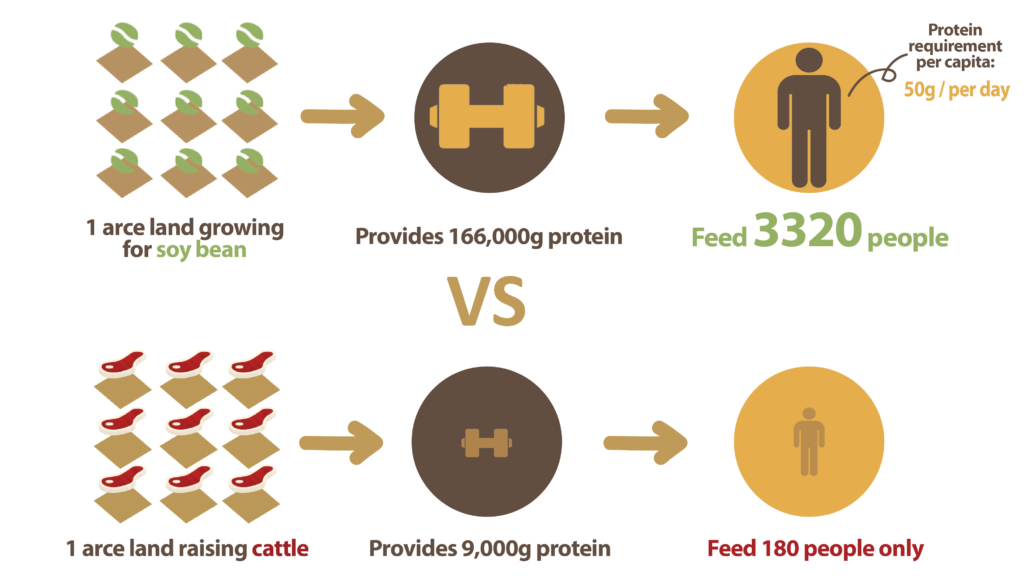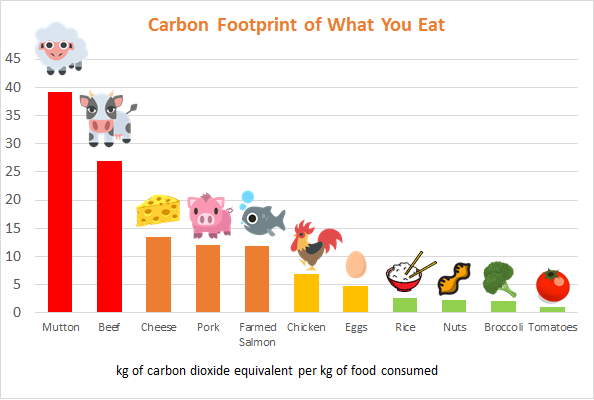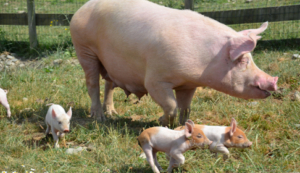Environment
Our Earth is facing serious threats of climate change, fresh water scarcity, deforestation and loss of biodiversity. Many are unaware that the livestock industry is a leading cause of these problems, and that the most effective solution is to choose Green and Healthy meals starting from one day a week.
Animal products are associated with high greenhouse gas emissions, freshwater consumption, and inefficient land use, described in the below sections
Livestock farming for meat, eggs and dairy has a large carbon footprint, producing 15% of the world’s Green House Gas, more than all the world’s cars, planes and other transport. A person eating plant-based foods 1-day-a-week for 1 year can reduce his/her CO2 emissions by 234 kg a year (estimated based on the carbon footprint of different food).
Source: Meat Eater’s Guide to Climate Change + Health by Environmental Working Group (2011)
The domestic water consumption per person in Singapore is 151 litres a day. This does not count in the “hidden water” consumed during the food production processes. A person eating plant-based foods for 1 day can reduce his/her water consumption by at least 180 litres (estimated based on the water footprint of different food).
Globally, about 2.7 billion people currently find water scarce for at least one month of the year. With the threat of climate change, 2/3 of the world’s population may face water shortages by 2025. The choice of our diet hence has a huge influence in addressing the global water shortage.
Source: Water Footprint Network
Livestock farming destroys forests and biodiversity. 70% of deforested land is used for farming livestock such as chickens, cattle, pigs, and growing livestock feed.
Many people in the world are malnourished, but large quantities of grain, soybeans, and corn are fed to animals to produce meat. Hence, the more meat we eat, the fewer people we can feed.

Source: GreenMonday.org
Health
- If not consumed in moderation, this can lead to heart disease, obesity and diabetes.
- The Singapore Heart Foundation states that we should be “replacing meat with beancurd, nuts, or other plant products periodically”.
- Processed meat in particular, has been put in the same class as tobacco and asbestos (Class 1), as it has a strong link to increasing the risk of colorectal cancer.
- Singapore Cancer Society, states that “animal fat is converted to bile acids which can promote cancerous changes in the colon”.
- Nuts and seeds contain essential fatty acids to reduce your cholesterol.
- Fruits contain dietary fiber, which protects your gut, and antioxidants which neutralize free radicals to decrease your risk of certain cancers.
- Vegetables contain essential vitamins and minerals to boost your immune system.
- Legumes, which include beans, are high in protein to help build muscles.
Eating less meat helps with more 50 different types of diseases, such as
- Cancer
- Obesity
- Early Puberty
- Atherosclerosis
- Diverticulosis
- Appendicitis
- Impotence
- Skin rashes
- Stroke
- Epilepsy
- Osteoporosis
- Hypoglycaemia
- Hiatal Hernia
- Varicose veins
- Hypertension
- Heart disease
- Dementia
- Rapid aging
- Gallstones
- Arthritis, Gout and Rheumatism
- Neuritis and Sciatica
- Nose bleed
- Irritable Colon Syndrome
- Colic
- Haemorrhoids
- Multiple Sclerosis
- Jaundice
- Indigestion & belching
- Kidney stones
- Increased infant mortality
- Blindness
- Diabetes
- Anaemia
- Lack of energy
- Liver disorders
- Ulcers
- Gangrene
- Peritonitis
- Gallbladder diseases
- Kidney diseases
- Constipation
- Chest pains
- Gallbladder inflammation
- Gallbladder gangrene
- Abdominal Pain
- Bleeding
Animal Welfare
The Cambridge Declaration on Consciousness, which was signed by an international group of neuroscientists in the presence of Professor Stephen Hawking, states that animals possess “neurological substrates that generate consciousness”. This means that all animals are aware of their surroundings and have emotions, much like us!
Sadly, animals still go through horrible lives in factory farms around the world. From young, they are separated from their mothers to be confined in small spaces, where they are mutilated and roughly handled to meet the demand for meat, milk and eggs.
We can do our part to help build a better world for animals, by buying fewer animal products!




